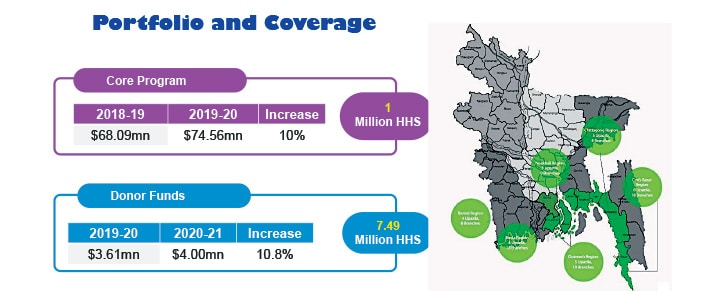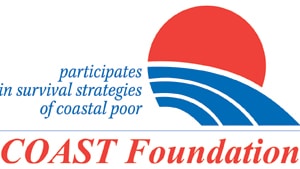Vision
Striving for a world of equity, justice and free from poverty where human rights and democracy are the common cultures.
Mission
COAST Foundation shall organize strategically important activities related to development, which will facilitate a sustainable and equitable improvement especially in coastal areas of Bangladesh for disadvantage section of population through their increased participation in the socio-economic, culture and civic life.
Objectives
The Objectives for which the Foundation constituted are any or all of the followings:
- To facilitate sustainable livelihood of the poor and marginalized, especially of the women and children, by providing microfinance and promoting enterprise development.
- To support and take neccessary steps to mediate initiatives of the poor in realizing their demands on government and other institutions where they have legitimate rights and shares, initiate programs/projects and activities, alone/or in partnership with others, with the aim of protecting and preserving the ecological/natural resources in the country specially of the Bay of Bengal.
Values
COAST values are related to Working Approach, Learning Attitude, Human Potentials, Economy, Honor, Culture, People’s Organization, Governance, Accountability, Participation, Gender, Transparency, Information Technology, and Bio-diversity.
- We exist for the poor and for their interest
- We work based on what we know
- Our thought must be updated
- We say what we understand
- We believe in the equality of human being
- Keep good relationship with all without compromising with values
COAST Strategy for 2020-24
Origin
COAST (www.coastbd.net) has emerged as an NGO from a ten-year-old project of an international NGO since the beginning of 1998. It was a project situated in the southern part of Bhola island, i.e., in the mouth of the Bay of Bengal where joint flow of world
mighty river Ganjes and Bramhaputra met, this is one of the world most dangerous; cyclone zone. It was for painstaking nationalization process have had happened during the period of 1994- 1997, mainly these are reducing overhead cost in building capacity
and enhancing coverage, empowering beneficiaries to change their role as an active partner of the development initiatives and finaly forming board to ensure local accountability.
It has also received a special consultative status from UN ECOSOC (Economic and Social Council). It is registered with the NGO Affairs Bureau (No. 1242) under Prime Minister office, Bangladesh Government and with Microcredit Regulatory Authority (No.00956-04041-00068). It is also registered under the Societies Registration Act, 1860 (Act XXI of 1860).
COAST Evolution and Strategic Plan 2020_24
COAST Origin, Rohingya Response and Future Strategy
Governance
- Executive Committee (EC) and General Committee (GC)
- Regular Quarterly Meeting of EC, Annual Meeting of GC
- Senior Management Team (SMT), weekly and quarterly meeting
- Consultative Status with UN ECOSOC
Excellence in Governance
- Stakeholder participation: One of the first NGOs adopted ‘Right to Information’, publishing program-based desktop newsletter monthly
- Complaint Response Mechanism with whistleblowing policy, complaint box at all the offices
- Transparent: All meeting minutes, policies and circulars are available in the website
- Quality Control: Separate Internal Audit and MEAL Section
- Need analysis and objective-based programs and advocacy
- Updated with Technogies: Using software based meeting system using Zoom, Gotomeeting etc.
- Quickly Adaptive: More than 100 sessions for staff on fighting COVID19, disinfection process in all offices Emergency Fund:Fast responder to any disaster in the working areas with own fund, medical facilities for staff, providing all costs of COVID19 treatment of infected staff.
Programs
- Core Program (with micro finance income, Microfinance, primary health care, People’s Organization, disaster response fund ,Community radio)
- Non-Core Program (with donor grants, Development programs, partnership with donors)
- Democracy and CSO building
- Advocacy at the local, national and international level (With EquityBD, focus climate justice, tax justice, inequality, aid/development effectiveness, CSO as a 3rdsector)
- Localization Campaign (BD CSO Process)
- Peacebuilding with Rohingya Refugee



